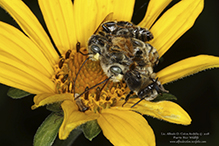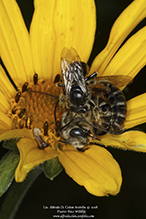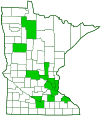Longhorn bees
(Melissodes Subgenus Eumelissodes)
Overview • Description • Distribution • Taxonomy

Overview
Eumelissodes is the largest North American subgenus of the longhorn bee genus Melissodes. It occurs throughout southern Canada, the United States, Mexico, and Central America south to Panama. There are 72 Eumelissodes species worldwide, 64 species in North America north of Mexico, and at least 13 species in Minnesota.
Eumelissodes fly late in the year, July through September. They are plant specialists, visiting only flowers in the family Asteraceae (sunflowers, daisies, asters, and allies). Most will visit any plant in the family, but some will visit only plants in a single genus.
Eumelissodes are solitary bees. They excavate vertical nests on flat ground..
Description
Eumelissodes are small to large bees.
The plate on the face above the upper lip (clypeus) is flat or protrudes only slightly, never more than half the width of the eye when viewed from the side.The cheeks (genae) are smooth and shiny, and they usually have short, straight hairs. The front margin of the plate over each wing base (tegulae) is gently concave.
The male is similar too the female, but the clypeus is usually pale, occasionally partly or completely black. The antennae are much longer.
Distribution |
||
|
Sources Biodiversity occurrence data published by: Minnesota Biodiversity Atlas (accessed through the Minnesota Biodiversity Atlas Portal, bellatlas.umn.edu, 10/10/2025). |
|
| 10/10/2025 | ||
Taxonomy
Order
Hymenoptera (Ants, Bees, Wasps, and Sawflies)
Suborder
Apocrita (Narrow-waisted Wasps, Ants, and Bees)
Infraorder
Aculeata (Ants, Bees, and Stinging Wasps)
Superfamily
Apoidea (Bees and Apoid Wasps)
Epifamily
Family
Apidae (honey bees, bumble bees, and allies)
Subfamily
Apinae (honey, bumble, longhorn, orchid, and digger bees)
Tribe
Eucerini (longhorn bees)
Genus
Subordinate Taxa
agile long-horned bee (Melissodes agilis) ![]()
dark-faced longhorn (Melissodes tristis)
dark-veined longhorn bee (Melissodes trinodis) ![]()
eastern thistle long-horned bee (Melissodes desponsus) ![]()
denticulate long-horned bee (Melissodes denticulatus) ![]()
Drury’s long-horned bee (Melissodes druriellus) ![]()
longhorn bee (Melissodes boltoniae) ![]()
longhorn bee (Melissodes wheeleri) ![]()
nimble long-horned bee (Melissodes subagilis) ![]()
pale-marked long-horned bee (Melissodes pallidisignatus)
small long-horned bee (Melissodes microstictus) ![]()
tooth-bellied long-horned bee (Melissodes dentiventris) ![]()
two-toothed long-horned bee (Melissodes bidentis) ![]()
valiant long-horned bee(Melissodes illatus) ![]()
vigorous long-horned bee (Melissodes subillatus) ![]()
Synonyms
Heliomelissodes
Common Names
longhorn bees
true melissodes bees
Glossary
Clypeus
On insects, a hardened plate on the face above the upper lip (labrum).
Gena
In insects: The area between the compound eye and the mandible; the cheek. In birds: The area between the the angle of the jaw and the bill; the feathered side (outside) of the under mandible. Plural: genae.
Tegula
A small, hardened, plate, scale, or flap-like structure that overlaps the base of the forewing of insects in the orders Lepidoptera, Hymenoptera, Diptera, and Homoptera. Plural: tegulae.
Visitor Photos
Share your photo of this insect.
This button not working for you?
Simply email us at info@MinnesotaSeasons.com.
Attach one or more photos and, if you like, a caption.
Alfredo Colon |
||
 |
 |
|
MinnesotaSeasons.com Photos
|

Slideshows

Visitor Videos
Share your video of this insect.
This button not working for you?
Simply email us at info@MinnesotaSeasons.com.
Attach a video, a YouTube link, or a cloud storage link.
Other Videos

Visitor Sightings
Report a sighting of this insect.
This button not working for you?
Simply email us at info@MinnesotaSeasons.com.
Be sure to include a location.
Catherine H
8/15/2020
Location: Columbia Heights, MN
They love my Joe-Pye bushes
Minnesota Seasons Sightings


